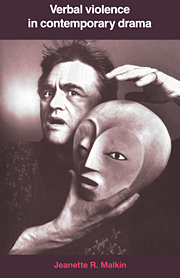6 - Conclusion
Published online by Cambridge University Press: 26 February 2010
Summary
The title of Handke's second full-length play, The Ride Across Lake Constance, refers to a nineteenth-century ballad by the poet Gustav Schwab, The Rider and Lake Constance. This ballad tells of a horseman who rode across the seemingly frozen Lake Constance only to learn, on reaching the other side, that the ice he had taken for solid was less than an inch thick. Hearing this, he drops dead from fright. In Handke's play this image comes to denote the “thin ice” of rationality, the abyss which, without our knowing it, lurks beneath the sign-systems we take to be solid and real. Botho Strauss interprets the analogy quite bluntly:
The ride parallels the functioning of our grammar, of our system of co-ordinating perception and meaning, and of our linguistic and sentient powers of reason; it is only a provisional, permeable order, which, particularly when, as in Handke's play, it becomes conscious of its own existence, is threatened by … schizophrenia and madness.
It is the unconscious nature of our assumptions about language which is here the important point; the madness which threatens – like Kaspar's “madness” once he rejects the coercive speech order of the Prompters – may be preferable to the tyranny of pre-ordered consciousness. The attempt to make the hidden dangers of our unexamined assumptions explicit, to expose the “thin ice” of convention, is one of the common denominators among all these plays.
This perspective, shared by so many postwar plays, betrays an implicit anxiety concerning modern man's capacity to fashion his/her own fate in the face of pervasive exposure to, and manipulation by, language.
- Type
- Chapter
- Information
- Verbal Violence in Contemporary DramaFrom Handke to Shepard, pp. 224 - 228Publisher: Cambridge University PressPrint publication year: 1992



